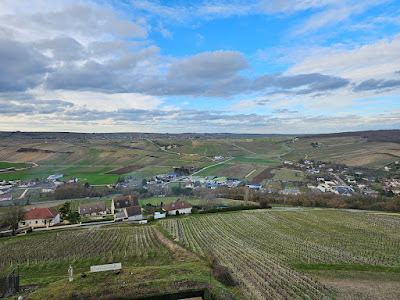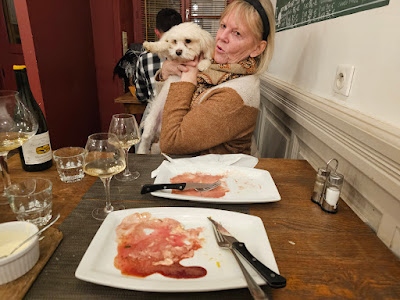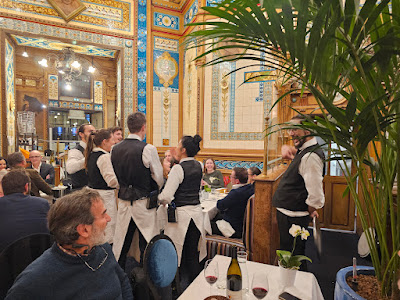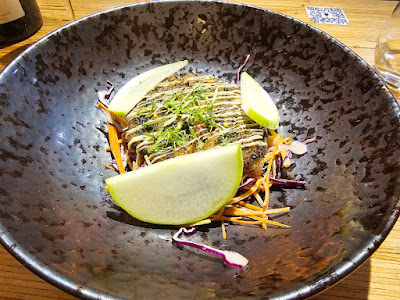The Loire Valley is not only a paradise for castle buffs and wine enthusiasts, but also .... for cheese lovers.
On the 2024 Loire Valley by ombiasy WineTours in June 2024, we will indeed spend lots of time visiting castles and wineries. Towards the end of the tour, when we are for 2 nights in Sancerre and will visit winemakers in the AOC Sancerre and AOC Pouilly-Fumé, we will also devote some time to cheese, more specifically, to the iconic Crottin de Chavignol goat cheese.
In France, cheese is made everywere. As for the Loire valley, the western part towards the coast, cow milk cheese rules, while in the eastern part of the Loire Valley goat cheese dominates.
See: The Loire Valley: Not only a Paradise for Castle Buffs and Wine Enthusiasts, but also .... for Cheese Lovers
It is the various kinds of goat cheese - Sainte-Maure de Touraine, Selles-sur-Cher,
Valencay, Pouligny-Saint-Pierre, Chabichou du Poitou and Crottin de
Chavignol - that people think of when
it comes to cheese in the Loire valley. We will focus on one of them,
the Crottin de Chavignol, when we spend 2 nights in Sancerre, a stone's
throw away from Chavignol, and visit a winemaker in Chavignol as well as
have a cheese-centered lunch in Chavignol at a well-known cheese
producer, Romain Dubois in Chavignol.
Fromagerie Romain Dubois is a leading affineur of Crottin de
Chavignal, with 2 outlets, one in Saint-Satur and one in Chavignol. In
Chavignol, in additon to the cheese store, Romain Dubois has a wine and
cheese bar, where we will have lunch and taste Romain
Dubois' Crottin de Chavignol at different stages of ripeness.
While we were in Sancerre in February 2024, we enjoyed a cheese tasting (with different Sancerre wines by the glass) at the hotel were we were staying and where the group will be staying in June.
We checked in at Fromagerie Romain Dubois and we had a Romain Dubois Crottin de Chavignol with the dinner we enjoyed at the bistro Au P'tit Goûter. See: Dinner at Au P'tit Goûter - a Friendly Little Bistro right in the Middle of Chavignol, Sancerre, Loire Valley - with Front-of-the-house Jérémy, Chef Jérôme Germain and Tuscany (February 2024)
Wine: In Sancerre and Pouilly-Fumé
Sancerre
Sancerre is a famous white Sauvignon Blanc appellation located on the left bank of the Loire, across from Pouilly-Fumé.
While
Pouilly-Fumé's vineyards are tightly clustered and homogeneous,
Sancerre's 14 communes (including the great villages of Chavignol, Bué,
Verdigny, Amigny and Ménétréol) are widely dispersed, covering nearly
3,000 hectares over vertiginous valleys at up to 350 metres above sea
level, and three distinct soil types: silex, a white flint found around
Sancerre and Ménétréol in particular, giving perfume and a fine
structure; terres blanches, a calcareous clay soil that whitens as it
dries (widely distributed), delivering a full, fruity richness; and
caillottes, a Portlandian soil brimming with large limestones imparting
both power and verve – as found in Sancerre, Chavignol and Bué.
A fourth soil type, griottes, tightly-packed with small limestones, has
also been identified – as found near the village of Vosges.
Kimmeridgean clay crops up less consistently than in Pouilly-Fumé and
since most Sancerre, bar the single-vineyard wines, are a blend of soils
the result is a richer, fuller and fleshier Sauvignon Blanc.
As with Pouilly-Fumé, an increasing number of (single-vineyard) wines
are being raised in French oak, mostly 500-litre and demi-muids; little
surprise in light of naturally higher alcohol levels due to global
warming. Sancerre Rouge is also made from Pinot Noir, the quality of which is often compromised by bleeding some of the juice to make rosé – Vincent Pinard is a master nonetheless.
Recommended producers: François Cotat, André Dezat, David Sautereau
Top vineyards include: Les Monts Damnés, La Grande Côte, Le Cul de Beaujeu, Grand (and Petit) Chemarin, Chêne Marchand
Pouilly-Fumé
Pouilly-Fumé is a famous white Sauvignon Blanc appellation located on the right bank of the Loire River.
Compared to Sancerre
on the opposite bank, the Pouilly-Fumé appellation is approximately
half the size at 1,200 hectares, and tightly-focused around the villages
of St Andelain and Les Loges on a fairly homogeneous, south-west facing
slope. The appellation's soils are divided between limestone-rich
Kimmeridgean and Portlandian (less active calcium) clay, with the cherry
on the cake being the red, flinty clay soils clustered around the St
Andelain knoll.
Top vineyards in Pouilly-Fumé include Les
Cocques, Les Bois and Les Cornets. The result is a floral, finely-poised
yet powerful nose, with a noticeably limestone-like dry palate kept
taut by a fine structure. Indeed such is the stony intensity of a good
Pouilly-Fumé that an increasing number of producers are ageing their
best crus in French oak, to good effect.
Recommmended producers: Didier Dagueneau, Alain Cailbourdin, André Dezat and the up-and-coming Nicolas Gaudry
Cheese: Crottin de Chavignol
teddingtoncheese.co.uk: Situated in the north-east department of the Cher, Chavignol is a hamlet near the town of Sancerre, which is famous for its wine production. The Crottin de Chavignol was first made as a snack to be eaten during the grape harvest. It took its name from the small clay oil lamp from the Sancerrois but was soon nicknamed 'horse droppings'. This was because crottin in French means 'dung' and because of the cheese's resemblance to horse dung when mature. The Crottin de Chavignol was granted its AOC status in 1976.
When fresh, a Crottin de Chavignol weighs 140g, but during the first two weeks of maturation it dries to 110g. The rind develops a white bloom with a bluish hue and can be eaten at this young stage. Its texture is moist and it has a light goaty flavour. After a further three weeks of ripening the small cheese shrinks to 70 grammes. It becomes harder and drier, and the flavour becomes fuller and the smell stronger. It is at this stage that we sell the Crottin de Chavignol at The Teddington Cheese.
The cheese can be matured for a further three months during which time it shrinks to 40g. The rind becomes pitted and brown, and sometimes black. The flavour is intense and the very hard rind can only be removed by grating.
Sixteen million Crottin de Chavignol are made every year, the majority in large creameries. The farmhouse Crottins we sell at The Teddington Cheese are made using unpasteurised goats' milk. They represent a very small proportion of the total production and their flavour is always superb. These small cheeses are excellent throughout the year although the very best, as with most goats' milk cheeses, are made from spring to autumn. Crottin de Chavignol are excellent as part of a cheeseboard and also fabulous when grilled and served warm on a salad as a starter. Alternatively, enjoy on their own with a glass of Sancerre de Chavignol wine.
Each Crottin measures 4cm in diameter, is 3cm tall, weighs 75 grammes and has a fat content of 45%.
Crottin de Chavignol - Variations in Style (New England Cheese Making Supply Company)
...Crottin de Chavignol can be eaten at various stages of the maturity process.
- After 8 days weighs 140gr (5oz) and has a strong nutty taste.
- After 21 days the cheese begins to come into its own with a much more complex flavor and the surface begins to show various molds developing.
- After 4 months, the cheese weighs only 40gr (1.5oz) and has turned into a more complex cheese. The surface at this point is covered with darker dried molds and the paste is very dense and strong in flavor.
- When the cheese is allowed to age even longer the surface will turn a grey/brown color and the body of the cheese will become very dry. The flavor becomes very complex but time to taste it is essential.
Tasting Crottin de Chavignol at Le Panoramic Hôtel in Sancerre
Le Panoramic Hôtel in Sancerre is a wonderful, recently
completely renovated 4-star hotel with breathtaking views over the
Sancerre vineyards and a stone’s throw from charming old town Sancerre.
At Fromagerie Romain Dubois in Chavignol with Gilles Dubois
The Dubois family has been producing goat cheese for four generations. Romain Dubois, the present owner, is passionate about cheese. He doesn't have his own goats; rather, he collects freshly made cheese from producers such as Jean-Franois Blain and ages it in the cellars of his fromagerie. The shop offers other fine cheeses as well as the local crottin.
Fromagerie Romain Dubois is right in the center of Chavignol. When you enter Chavignol coming from Sancerre, on the left side you find the Fromagerie Dubois-Boulay. It was owned by the Dubois family until about 10 years ago, when Gilles Dubois sold it.
Gilles Dubois, who we met at Fromagerie Romain Dubois now helps his son Romain run the cheese store and bar, where we will have lunch.
To end the Dinner: Crottin de Chavignol at Au P'tit Goûter in Chavignol
Gilles Dubois also owns the bistro Au P'tit Goûter down the road where we had dinner in Februar 2024.
Thus, we decided to go to Au P'tit Goûter in Chavignol, which I had discovered when we were in Chavignol and which I found very inviting. We took our car and went back to Chavignol.
We had a great time at Au P'tit Goûter, a friendly little bistro right in the middle of Chavignol. Everything was there: the good ambiance, the good, home-made food, the good Sancerre wines and the good humor of Jérémy and Jérôme - without forgetting the little dog Tuscany.
See: Dinner at Au P'tit
Goûter - a Friendly Little Bistro right in the Middle of Chavignol,
Sancerre, Loire Valley - with Front-of-the-house Jérémy, Chef Jérôme
Germain and Tuscany (February 2024)
See: Announcement: Loire Valley 2024 by ombiasy WineTours (Sunday, June 09 - Thursday June 20, 2024)
















































No comments:
Post a Comment